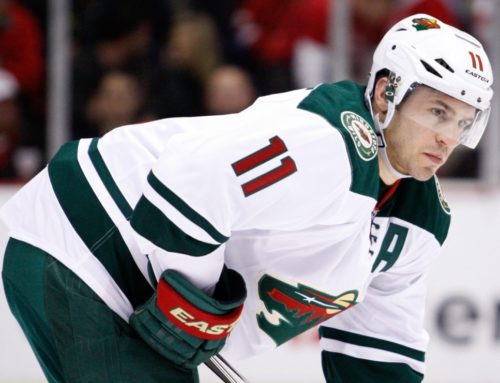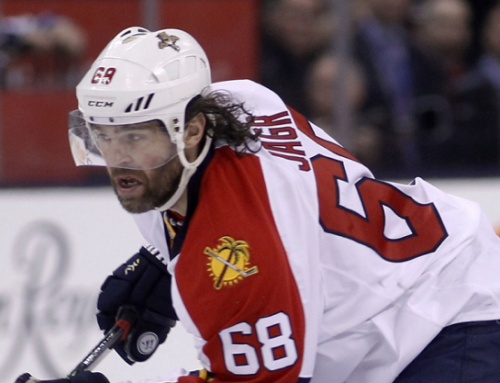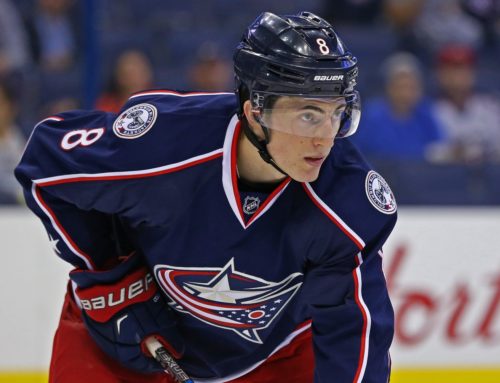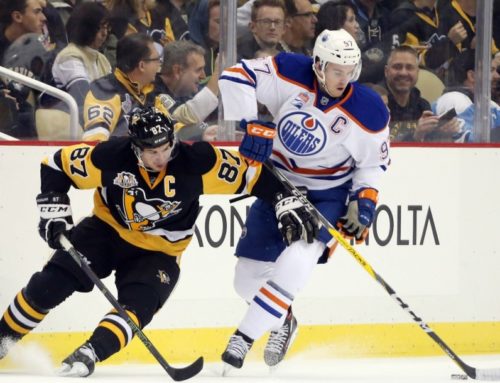The Contrarian – Every Thirty Years
Demetri Fragopoulos
2016-06-26

Should teams be rewarded for ineptitude with the very best prospects?
You will likely be reading this as my keeper league’s annual summer draft will be underway. It is a little bit different than the NHL’s Entry Draft because we include our undrafted players and free agents into the mix with the new draft crop. But it is as exciting as the real thing.
Who will go first overall? What deals will get made? Who is that owner taking so long to make a pick debating on? Will I get the guys I want?
These are exactly the same questions that were being asked last Friday night.
Inevitably at every draft someone asks “Why should <insert name of owner> get first overall pick? They’re just going to mess it up.”
We saw stories come out earlier this year about how some hockey people felt that there should be a cap on how many times a team could draft first overall. A new article by Dan Bilicki of the Toronto Sun deals on that subject by asking why failure should be rewarded.
“We’ve created a system that rewards failure and it is hurting sports,” and, “You should have to do more than win a slanted lottery to earn the pick,” writes Bilicki.
He feels that teams are purposefully tanking in order to be rewarded with the first pick in their drafts, or at least a high draft pick pending any lottery rules and results. Believing that teams sully the integrity and ethos of sports which is to be your best at all times. Not to be your best only when you have a chance to succeed and to be horribly awful when you know that you do not have the slightest chance to win.
The issue is paired with parity. If we give worse teams a chance to become better they will become competitive and thus have less of a desire to tank in subsequent seasons. That does not talk about how a team becomes a bottom dweller to begin with.
An assumption is made that the circumstances that brought that team to be one of the worst teams was by design. It does not matter if the team lost key players through injury, retirement, trades or free agency. Nor does it factor if the team was terrible with contract signings or drafting of players. It only matters to the argument that the team has made a conscious decision to be terrible in order to be awarded the highest possible draft pick.
A few ideas are bounced around in the article regarding how to fix the mechanism of the draft system (I personally like the losers-playoffs). But none look into why a team became bad and then wanted to be the worst team.
The question of why leagues reward failure is not eliminated even if the lottery system is tweaked. It still rewards poor performance. It still rewards poor sportsmanship and behaviour.
One of Bilicki’s references is how European soccer relegates poor performing teams to a lower tier when they end up at the bottom. This is the deterrent for teams, since they cannot afford to purposely drop in the ranking because their fans will rebel. More importantly, the team would not earn as much revenue.
Let us take the main argument and apply it to fantasy sports. Why do we reward the worst teams with the best opportunity in our fantasy drafts?
First, if we did not have some method to provide lower-ranking teams a way to naturally improve, then owners would drop out of leagues. I am not saying that after one bad season people would leave, but after a few losing seasons (or after a few seasons where there was clearly no chance to win a prize,) owners would say adios and look to join another league where they would have a better chance of winning.
Would you like to be a part of a fantasy league that was in constant turmoil? Would that attract more owners to your league?
Stability is of ultra-importance to maintaining a league.
Second, all these systems do is grant the losing teams a better opportunity. You are not guaranteeing them anything. You are not taking a player off the best team and handing them over to the worst team.
If you have ever played cards at school, there is a game called ‘President’ (actually it is usually called something else). In this game the lowest person must give their best two cards to the president and they hope that the president bestows upon them something that could help them. The second worst player must exchange one card in a similar way with the vice-president.
While this game is fun because you get to rib your opponents, when they lose there are two faults: 1) A new hand is dealt every time so you do not build on previous cards that were dealt, and 2) It gets boring really fast. It is mindless.
Imagine if this game reversed the exchange to where the president had to give up their best two cards and the lowest team returned two lesser ones in return. Would it be any better? No.
That is because the people winning would say, “Why am I being penalized for doing better than the other participants?” The same sentiment would apply to real and fantasy sports leagues.
That is why the opportunity to get better is given to the worse ranking teams. They still have to pick the right players and make the right moves.
Do you know that 14 of the 53 first overall draft picks ever taken in the NHL Entry Draft have won a Stanley Cup? Only seven of those first overall picks are inducted into the Hockey Hall of Fame? Hardly a slam dunk for guaranteed success.
When there is opportunity, not only does it exist for success, but also for failure.
Lastly, it cannot be about spending money. Any league that says the only way a bad team can get better is to throw more money around is going to fail miserably.
Usually when we discuss the topic of how to prevent tanking, we continue to give the owners the choice of who they can select.
What if there was a draft but the league decided to have a system that ‘dealt’ out players as they (e.g. NHL Central Scouting) ranked them? That way the ownership groups could not make ‘bad’ picks.
It is not that much different from the ideal of the “draft wheel,” where everyone gets a first overall pick every 30 (now 31) years.
Tell the Edmonton Oilers that they are now technically not bad having selected all those number-one ranked players. Yet they still found a way to fail.
It is because players are not cards where their strength and weight is predetermined. It is also not a closed system (only 52 cards in a deck), and there is no consideration of what is needed or wanted by the team. The lottery wheel also does not take into account that some draft years are going to be better than others.
Even if bad drafting was fixed, that does not mean that bad trading or poor contract signings and negotiations would be eliminated. Would the league institute a salary range scale so negotiations would be predictable (the NHLPA would never agree to)? Would the league also regulate that trades had to fit certain value measurements?
Example, Team A wants to trade a 30-year-old goalie with save percentage of 0.915, a goals-against average of 2.99 is evaluated to be worth 88.2 on the trade scale. Then the other team would have to come up with a combination of players and picks that would be plus or minus 5 points of the goalie’s evaluation to be considered valid by the league. Of course Team A would have to want what was being exchanged.
Having some sort of trade standardization does not mean that it would be accurate or even equal. Only an illusion of making things equal and fair and still does not eliminate chance or chemistry. How can someone or some formula evaluate that? The answer is that you cannot.
Like it or not people will make mistakes that will cost them. In real sports it will mean people will be fired, players will be traded, contracts will be bought out, and teams will lose.
In the fantasy realm, it means that mistakes will surprisingly knock out contending teams, make rebuilds longer to accomplish, and owners extend their streak of contributing to the prize pool.
One last line from Bilicki’s article: “If you look overseas, the notion of losing on purpose would make fans sick.”
What makes fans sick is seeing their home team aimlessly throw darts at a board and say that they have a game plan.
What makes fans puke is hearing how their team’s players need to work hard and play better defense when the farm system can only develop fourth-line talent.
What makes fans act out in frustration is seeing their hard-earned money be used by their favorite team to sign a player to a large multi-year contract because he had one decent year.
What gets fans angry is when their home team decides to charge more for game tickets and apparel and they have not done anything substantial in 15 years.
Fans will be understanding when the team admits that they were in error and has decided on a plan of action that will be painful at first.
Fans will be forgiving when they see current players with talent leave the team in exchange for prospects and draft picks.
And as you witnessed on Friday night, fans will be cheering when their team selects first in the entry draft.
If their team does things right and gets lucky, they will not need to do it more than once every thirty years.
2 Comments
Leave A Comment
You must be logged in to post a comment.





 CAR
CAR NYI
NYI BOS
BOS TOR
TOR VAN
VAN MTL
MTL EDM
EDM WPG
WPG ANA
ANA

Great article! What does your league do to determine the draft order?
Mine (inaugural season was last year) is currently debating how we want to do it in the future. At the moment, we follow something similar to the NHL with a lottery for the first round with a cap at how many spots you can move up or down, every team, except for those that won money (1,2,3 in a 12 team), can move up to 3 spots I believe.
we draft fresh squads (non dynasty)every year and just let the espn league generate it for us 30 mins before our draft. I won lastyear and will host the draft party thistime, can guarantee ill have my guys sauced up and hopefully effecting their drafting ability.
When money is on the line (our league is $150 entrance fee, ten guys with atleast 8 of them back for 5+ seasons), it has to be fair every year and not reward a guy just because he sucked last season.